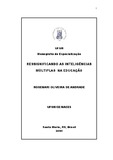| dc.contributor.advisor | Marquezan, Lorena Ines Peterini | |
| dc.creator | Andrade, Rosemarí Oliveira de | |
| dc.date.accessioned | 2015-09-18T13:26:31Z | |
| dc.date.available | 2015-09-18T13:26:31Z | |
| dc.date.issued | 2005-03-15 | |
| dc.date.submitted | 2005 | |
| dc.identifier.uri | http://repositorio.ufsm.br/handle/1/1029 | |
| dc.description | Monografia (especialização) - Universidade Federal de Santa Maria, Centro de Educação, Curso de Especialização em Educação com ênfase em Psicopedagogia Institucional, RS, 2005. | por |
| dc.description.abstract | The present bibliographical research search to study the theory
of the multiple intelligences and its applicability in the education, checking
that its knowledge can bring significant changes for us educators,
studentes, parents... and other professionals, among them
psychopedagogue. The thory appeared as a critic to the standard
psychometria, that it valued through tests of QI, just two intelligences: The
Logical-mathematics and Linguistics. Of this way, the concept of
intelligence was enlarged, that in its opinion can be defined as " a potential
biopsychological process information, that it can be activated in a cultural
scenery to solve problems or to create products that are valued in a
culture ", establishing criterious so that an intelligence is considered as
such, from its manifestation in cultural groups until the location of its area
in the brain; identifying the following intelligences now: Linguistics or
Verbal, Musical, Logical-mathematics, Space, Cinestesycal-corporal,
Naturalistic, Interpersonal, Intra-personal, and Espiritual/Existencial (as
stocking intelligence some approaches are still being researched).
Because some criterious are still being researched and the fundamental
points of the theory are: number of competences is not definitive neither
central, fundamental it is the multiple character. The intelligences interact;
The intelligence is not only and it cannot be measured. It considers
differences, it doesn't label, it standardizes or it measures abilities. Finally,
in this new scenery of the Multiple Intelligences, the teacher occupies its
role again as important and fundamental presence, rescuing the most
important of the professions that is to be educating, in its mission of
stimulater of the intelligence and agent orientater agent of the happiness
heading for an education for the understanding, for the citizenship for
good, the beautiful and the true. The theory of the Multiple Intelligences,
proposes new evaluation perspectives, allowing the students
accomplishments in several areas of the knowledge, enlarging like this
multiple possibilities in education. | eng |
| dc.language | por | por |
| dc.publisher | Universidade Federal de Santa Maria | por |
| dc.rights | Acesso Aberto | por |
| dc.subject | Educação | por |
| dc.subject | Inteligência múltipla | por |
| dc.title | Ressignificando as inteligências múltiplas na educação | por |
| dc.title.alternative | Resignifying the multiple inteligences in the education | eng |
| dc.type | Trabalho de Conclusão de Curso de Especialização | por |
| dc.degree.local | Santa Maria, RS, Brasil. | por |
| dc.degree.specialization | Educação com ênfase em Psicopedagogia Institucional | por |
| dc.description.resumo | A presente pesquisa bibliográfica busca estudar a teoria das inteligências múltiplas e sua aplicabilidade na educação, comprovando que o seu conhecimento pode trazer significativas mudanças para nós educadores, educandos, pais... e demais profissionais e entre eles o psicopedagogo. A teoria surgiu como uma crítica à psicometria padrão, que valorizava através de testes de QI, apenas duas inteligências: A Lógico-matemática e Lingüística. Desta forma ampliou-se o conceito de inteligência, que em sua opinião pode ser definida como um potencial biopsicológico para processar informações, que pode ser ativado num cenário cultural para solucionar problemas ou criar produtos que sejam valorizados numa cultura , estabelecendo critérios para que uma inteligência seja considerada como tal, desde sua manifestação em grupos culturais até a localização de sua área no cérebro; identificando atualmente as seguintes inteligências: Lingüística ou Verbal, Musical, Lógico-matemática, Espacial, Cinestésico-corporal, Naturalista, Interpessoal, Intra-pessoal, sendo que a Espiritual/Existencial (como meia inteligência alguns critérios ainda estão sendo pesquisados). Sendo que os pontos fundamentais da teoria são: número de competências não é definitivo nem central, fundamental é o caráter múltiplo. As inteligências interagem; A inteligência não é única e não pode ser medida. Considera diferenças, não rotula, padroniza ou mede habilidades. Enfim, neste novo cenário das Inteligências Múltiplas, o professor ocupa novamente seu papel como presença importante e fundamental, resgatando a mais importante das profissões que é ser educador, na sua missão de estimulador da inteligência e agente orientador da felicidade rumo a uma educação pela compreensão, para cidadania para bom, o belo e o verdadeiro. A teoria das Inteligências Múltiplas, propõe novas perspectivas de avaliação, permitindo a educandos realizações pessoais em várias áreas do saber, ampliando assim múltiplas possibilidades em educação. | por |
| dc.publisher.unidade | Centro de Educação | por |


